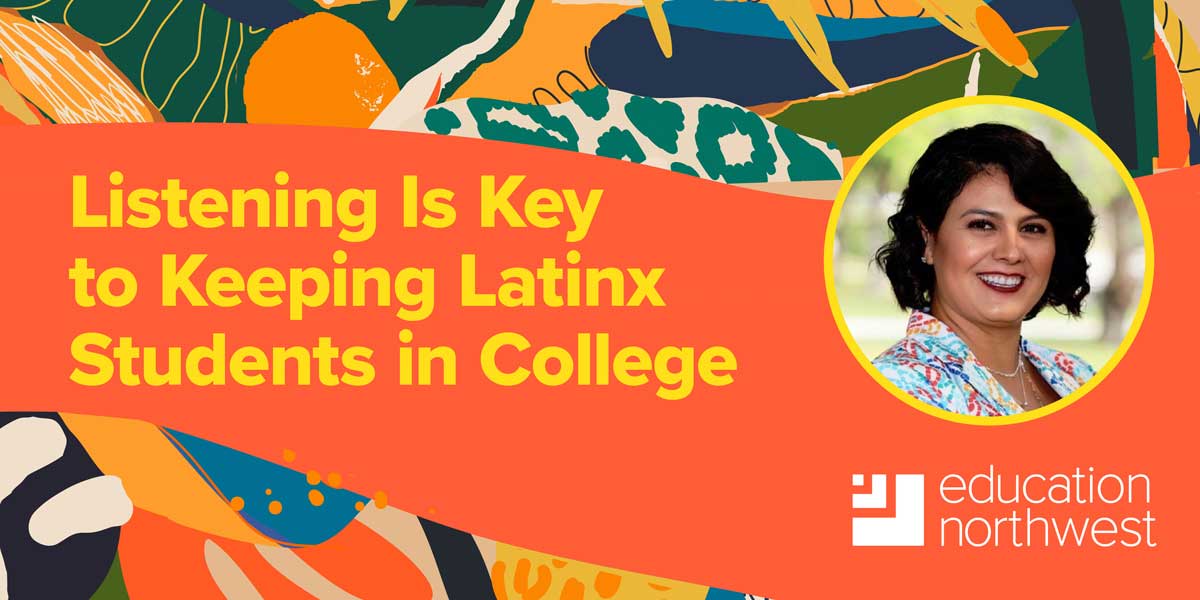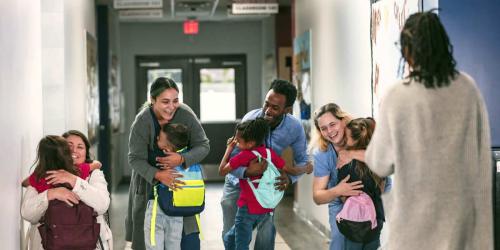Listening Is Key to Keeping Latinx Students in College

As Assistant Dean of Enrollment Services at the College of Southern Idaho (CSI), Monze Stark oversees the two-year institution’s programs assisting students of all kinds. She does this by helping students register for their first year of classes, secure financial aid, and continue their educational journeys—wherever that may take them.
Part of her role, she says, is “making sure they understand there are multiple pathways they can go through in their lives.” One pathway could be completing two years at CSI to earn an associate degree. Others could be pursuing technical education or earning a certificate that may help them get a promotion at their current place of employment.
A graduate of the University of Idaho through its College Assistance Migrant Program, Stark says she didn’t necessarily set out to build her career in college recruitment and retention. But after graduation, her alma mater offered the opportunity to become a recruiter. “When I started recruiting and getting to know families,” Stark says, “I realized I had a passion for helping others who had been in my situation.”
Every student has concerns and reasons for not continuing their education, and unless we peel back those concerns, we’ll never find out what is the core reason.
That situation, Stark explains, was finding out at a young age that she was undocumented. “I pretty much knew that I wasn’t going to get an education,” she says, “because I couldn’t afford it. Federal aid is only available to those who are legally in the United States.”
In her senior year of high school, Stark finally got her green card. “Someone up there loves me,” she says. But her path to postsecondary education still wasn’t entirely clear. She would be the first in her family to go to college, and the university was a nine-hour drive from home. “My father said, ‘I don’t think so,’” she says. “It took me a lot to convince my dad to let me go.”
The lived experience of navigating the college admissions process as a formerly undocumented person helps Stark understand some CSI students’ challenges—especially Latinx and other immigrants. “The Magic Valley is increasingly becoming home to non-Spanish-speaking refugees,” she says. “Every time a student walks in the door, I really, truly take the time to listen. Not just to hear their story, but fully comprehend what they have to say and what their struggles are.”
This individualized approach to helping students move along their path takes time and effort. Still, Stark knows from personal experience how important it is. “I’ve always said that we retain one student at a time because of what is happening with them right there and then,” she says. “Every student has concerns and reasons for not continuing their education, and unless we peel back those concerns, we’ll never find out what is the core reason.”
Stark finds that many students are dealing with the obstacle of legal status, as she did—not necessarily their own, but their parents’. “When a student hears you have to provide certain information so you can receive federal aid,” she says, “they pause. They say, ‘how is this going to affect my parents? Will I be putting them at risk?’” When CSI students complete the Free Application for Federal Student Aid (FAFSA), they are often selected for verification, which means proving the financial information they’ve provided. For the students Stark works with, she says, “when they hear that word ‘verification,’ the first thing they think of is some kind of legal matter. It can make them question our motives.” In response, her office is working on changing the language they use to “something straightforward and positive, like ‘complete your financial aid.’ Something that a student doesn’t just look at and shutdown saying, ‘I’m finished with this.’”
“Especially for the Latinx population,” Stark says, “the familia, the family support, it is so crucial. It’s almost like you get their blessing for their student to continue their education. When they get that blessing, you want them to finish because you want them to feel like that blessing was worth everything.” Often, she notes, Latinx students’ diplomas don’t end up on their office or bedroom wall but their family’s living room wall. “We say we did that for our family,” she says. Again, Stark’s own experience showed her the way. After she proved to her initially skeptical father that she could succeed at college, her three younger sisters followed in her footsteps—even the youngest, who at one point wasn’t sure she wanted to. “My dad said, ‘you’re going to college,’” Stark says.
Of course, COVID has forced college enrollment staff members to change how they operate. CSI representatives can’t always go where the students are, such as churches, community organizations, or even the Mexican consulate. Stark used to do presentations at these locations for families when she was a recruiter. Instead, they use drive-through FAFSA events, Zoom calls, Facebook Live streams, and other new tactics.
Working for a Hispanic-Serving Institution (meaning at least 25 percent of the students identify as Latinx), Stark and her colleagues are helping the college adapt in other ways. She’s interested in how institutions can increase equity by changing how they collect demographic data so bicultural students, like her own son, don’t have to choose just a part of themselves when identifying their race or ethnicity.
Understanding intimately who Stark’s students are and what they’re going through is the first step to supporting them. Whether the issue is not knowing what degree they want to pursue, being nervous about taking math when returning to school after years in the workforce, or needing additional financial support for child care, Stark and her team help find the right solution. “The answer is always yes. We can help,” she says. “You just have to listen to and understand what their needs are—then find a way to make it work.”



